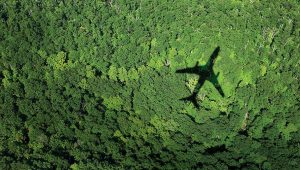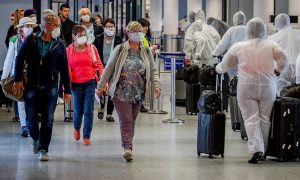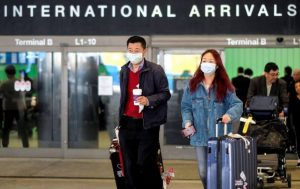Tourism Destination Governance and Development – Provocative Takeaways from Pre-Covid19 Times for a more stable and brighter Future after the Crisis – by Richard Adam, Chief Executive OPTIMIST, NED Board Member, Strategist, Intl. Developer (Destination, Resort, Real Estate). First published at Linkedin.
Every now and then, we all have seen tourism destinations temporarily dropping out of the market due to natural disaster or political crisis. As a non-affected observer, you may tend to say `bad luck` and continue business as usual. However, on the day I write this, tourism and travel have been completely extinguished for a couple of weeks already – on a global scale. For all of us, this is the first time that we see the impossible happening: the world´s largest industry has collapsed within a week, at a time, in which this industry conditioned itself to believing in unlimited growth and invulnerability.
In my 25 years of relevant executive assignments on 4 continents in the development and management of destinations, I gained significant insights and made many personal observations, reflections and analysis on the subject, including appreciating the importance of learning from successes and failures. You may not agree with everything I say but I am fairly sure, a few thoughts below may be haunting you for quite a while, if you are related to this industry.
In getting prepared or matured or improving an existing base for the upswing again, which will happen in one way or the other, it is reasonable to look back for a while, let´s say 10 years.
What significant factors have impacted tourism in the past then years?
Here are a few examples.
- Demand aggregators like Priceline (Booking etc.), TripAdvisor, Expedia and others have become the dominating distributors in tourism and Google has turned into the primary gate-keeper for information (More details here)
- Global hotel system giants have hijacked the hospitality industry sacrificing guest experience by pushing labeling and branding attempts to a state of saturation (more details here).
- China has risen from an almost irrelevant to the most important source market on the planet. Due to economic growth, other countries with large population such as India or Indonesia have generated growing upper and middle class with strong interest to see the world.
- In the Middle East, Emirates Airlines has become one of the world´s biggest carriers. Based on Emirate´s hub strategy, Dubai has turned into a hotspot of city tourism. Two additional Gulf carriers, Qatar Airways and Etihad, have created fierce competition and tremendous capacity to satisfy the massive demand to travel from relevant Asian countries to Europe and vice versa.
- In Central Europe, the consumer climate was excellent for more than 10 years in a row, as good as never before. Making a few trips per year, be it for business or leisure, has become a normal matter for international and local tourists.
As seen from my personal perspectives, currently living both in in Switzerland and Germany, a few Mediterranean destinations became temporarily unavailable due to political or economic crisis (e.g. “Arab Spring” countries, also Greece, Turkey). Swiss and German travelers increasingly reacted by rediscovering their home turf. As a consequence, these two countries along with a few other European ones, were benefitting from tremendously increased numbers of international visitors, as well as from reinforced demand in their domestic travel markets. In particular city tourism was continuously soaring to new heights, almost everywhere. In Germany and Switzerland, some cities became ´cool and sexy` international tourism hotspots, e.g. Berlin, Munich, Hamburg, Zurich, Lucerne and a few others.
Let´s face it, if a place is regarded ´cool and sexy`, it is due to swarm intelligence and not because the local tourism promotion created it. In Australia, Melbourne is officially seen as one of the coolest cities internationally and regularly shows up in various global rankings. Then again, if you paid attention to recent swarm intelligence in that part of the world, you would have noted that Brisbane is coming up strong, which nobody would have believed only a few years ago. Swarm intelligence is not listening to tourism promotion, it has other indicators, in particular in today´s world of consumer digital sharing of information and feedback. Global destination evergreens, such as London, Paris, Hong Kong, Bangkok or New York City also had steady increasing visitor numbers. Venice, Barcelona and Amsterdam even complained about “overtourism”. In a nutshell, tourism has grown everywhere and so has the investment in new attractions or hotels or features to attract additional visitors.
In other areas of my personal horizon of insights, for example, South East Asia, China or the Middle East, commercial tourism does not have a history stretching over centuries and therefore not everybody is aware of the learning patterns of ups and downs of mature destinations or related scientific research. Other than in mature destinations, in rapidly emerging destinations we find continuous growth of global tourism has created another myth: “Build something glossy and spectacular and they will come”. When the result is spectacular or iconic enough, tourists may come automatically. In some cases, however, what was meant to be an iconic “honeypot” turns out into a “white elephant”. Well, in times of Covid19, currently all destinations are white elephants, some will pick up again; some will remain in a state of desperation.
The recent 10 years have led to certain mindsets and practises in tourism. Some may be relative to certain geographical areas, some may be of general nature; with some you may disagree. The fact is that, for the time being, it´s all over anyway.
Destination tourism is actually hit twice by Covid-19, in supply and in demand. First it will be complicated enough to reopen supply as long as the virus is not under control. Second, the demand pipeline will not be there for a long time due to weakened consumer climate, restricted travel logistics, health concerns and general uncertainty or even trauma. As the German Minister for External Affairs recently said: “We cannot organize flights to repatriate 240.000 citizens again.”
We have a new exceptional temporary state of emergency for a while, which allows us to step out of the usual treadmill and reflect known practises or good and bad habits. It forces us to think what to do better or differently for the times ahead.
Takeaway 1: Performance criteria
Here is the question: What is a continuously increasing development doing to the marketers and tourism executives of destinations, at least in the public sector in mature or even saturated destinations? Are they critically rethinking their approach of what to do better or what to improve in quality and yield when everything seems to be working for them? In this situation, you most probably lose your ability to distinguish between cause and effect.
It is a bad habit and should be changed. Unfortunately local tourism officials in the public sector and politicians are widely assessed by reporting of their visitor numbers. In gold rush times, it is not a difficult thing to achieve positive assessments. Most people in city tourism units became so used to presenting record numbers each year that they might have taken them for granted. If this is ongoing for over a decade, it is human nature to lose sight of the underlying causes. In long standing gold rush times, especially when you lose the ability to remain alert and self-reflective, you may start to think your marketing genius created all of that. However, in hotspots that´s hardly ever the case. You just get overwhelmed by the development of external factors that fall into your lap without significant contribution from you and that benefit from private initiatives and investments. If you are a tourism manager of a popular hotspot destination, the best thing you can do or still need to do is to provide adequate communication service to B2B and B2C stakeholders and get a few basics under control. That´s not rocket science!
While managers of striving emerging destinations are ambitious or often forced to create special experience along visitor journeys, to question, re-think and re-engineer offerings, officials of mature (or saturated) popular hotspots get into a mindset of “coping” with tourism rather than developing it. Consequently, this affects the attitude of people in charge, especially when growth shows over a long period of time and reporting the record numbers and self-praise become the dominating routine. Contrary to private businesses with opportunities to grow based on economies of scale, in hotspots, public authorities become blind, as they define themselves by visitor numbers and the known phenomena of tourist traps and questionable practises arise. What ambition remains beyond “patting yourself on the back”? Seen in the light of the product lifecycle theory, many long standing popular places already needed a relaunch, substantial repositioning before such an incisive incident as Covid-19. In post-Covid times, the laissez faire strategy of mass tourism in popular places may heavily backfire when people start to avoid big crowds which will be a logical consequence for a long long time due to lingering health concerns, hygiene and prevention measures and trauma.
When travelers are flocking in due to supportive global development and supply is no issue, what remains as a challenge and responsibility? Correct, you are tempted to lose your focus of becoming better. Who has stopped becoming better, has stopped being good. This is more or less the same principle that describes why the same team does not win the football world cup twice in a row! Except in public tourism the competition isn´t really driven by tourism offices. Here, the investors and visionary entrepreneurs create the difference in value proposition.
In times of flying high, as a public tourist office, you usually do not redevelop or restructure your strategic approach as you would do in less popular or distressed destinations. When things are succesful, why change anything? Also the real impact of promotional activities is questionable anyway, as tourism budgets are too small to leverage market penetration, unless you come up with something completely out of the box, which I have not seen for a long time. If nothing would come from a hot spot public tourism office other than the normal basics and the string of regularly reported record numbers, would anybody find out? The work of tourism officials in hotspots is less challenging and less demanding because they can hide behind ever increasing numbers and make their stake holders believe, that it is all due to their brilliant work. Depending on where you come from regarding the popularity of a destination, in rare cases, that may be true, however, in most cases it is not.
I must admit to know the temptation. In my 10 years tenure at the helm of a destination with 44 million visitors and 110 mil. commercial overnight stays per year with an annual revenue or 50 billion Euros, the numbers were flattering my ego, especially compared to the numbers of my competitors in the country, all performing at a much lower levels – in terms of visitor numbers. Considering the fact that I had built the organization from scratch starting as a one man show, I was tempted to believe, that I had played a significant role in this. Years later, when involved in much more complicated development and restructuring missions in the private sector, I better understood the difference between actual figures and personal impact. Today, with the blessings of wisdom and maturity, along with experience, I appreciate that you always depend on others and stake holder management is key.
In summary, second tier tourism destinations strive and fight to get to the next level, some with strategic sound concepts or at least with creative or intelligent measures. Hotspots do not do that because it works anyway. Falling into the trap of business as usual is very common, when lacking the pressure or need or ambition or all three. In general, in hotspots, tourism managers in the public sector cannot do much wrong. However, in second tier destinations, managers have to do essential things right to get to the next level. It is certainly more demanding to try making cream out of skimmed milk than to have plenty of cream to go around.
In terms of destination development from a greenfield perspective and the holistic thinking that should go along with it, I have published an article already a few months ago. For further details see here.
Consequence 1:
This is not new, but it is still unsolved and it might be the perfect time to tackle this issue. Destination tourism marketers or authorities define themselves via visitor numbers. However, visitor numbers are not really the objective of development or investment in tourism destinations. You expect revenue, profit, jobs, reinvestment, taxes, synergies. Therefore, a Covid-19 shutdown would be a perfect time to restart with a new and decent system of key performance indicators (KPI). Local destination managers should be striving to support local welfare in terms of new jobs, certain taxes, investment, RevPar and other real asset development. Value based strategies, instead of headcounts. The data for such strategies are available and it is not overly complicated to put it into a set of KPIs to measure performance of local tourism authorities, instead of taking the credit for record visitor numbers in good times and taking external factors as excuses in bad times. There is no point in that, so why rebuilding a destination management system of yesterday again.
You get what you go for. So it is essential how you define objectives and the KPIs to measure performance and how you define them. Pure visitor numbers as objectives and measure of performance certainly do not reflect a real asset. So, why not strive for a quality approach to increase the destination welfare. An isolated focus on visitor numbers (not related to other factors) is useless as it does not say anything about destination development or the performance of destination management.
Takeaway 2: Executive profiles
The development of stable and long-lasting success (due to external factors) influences the mindset of local authorities when it comes to hiring new tourism executives in the public sector. Myth #1 is the assumption that people from known hotspots are better marketers than people from second tier places, which is very far from the truth. Myth #2 is that these authorities create a profile of criteria which is very much based on what they know with the usual, buzz words based, box-ticking-exercise when hiring new tourism managers. In most cases, this is thinking in terms of promotion (in times of a sharing economy and advocacy, promotion does no harm but even less so does make a real impact, it is not providing the core leverage effect). It is not thinking in terms of what you might do, to get to a next level of competitive edge or value or other strategic assets. Tourism promotion, – marketing, -management or -development for a destination are different things and isolated promotion has the smallest – if any – impact.
You can easily find people, who can run promotional campaigns, establish B2B relations and visit trade shows backed up with the creativity of agencies. That is not rocket science, but unfortunately common (limited) thinking. Making noise in a `copy/paste` manner is good enough for many when external factors secure growth. However, to strategically reposition a place, develop and integrate stake holders, create a viable visitor experience at all touch points etc. is another dimension. In times when disruptors have demonstrated their ability to change business landscapes, hiring mechanism in destination development is supposed to address disruption even more. In terms of ´above the line´ activities, many people can do the job. However, below the line, that is what makes the difference, especially towards economic sustainability. Again, in gold rush times, the ambition of making a difference and therefore the dedication to hiring out people who think out of the box and who are capable going beyond the usual aspirations and making the difference, is hardly existing. As Steve Jobs once said: “Some companies hire smart people and tell them what to do. We hire smart people to tell us what to do“.
Consequence 2:
Covid-19 Shutdowns will destroy many jobs in the industry but may create new hiring waves when things pick up again. For destination executives, the model of pure promoters with experience in above the line advertising, who love the travel show tourism to get away from their homework, the logo distribution and campaigning, will be obsolete. You will need developers of visitor experience at all aspects, integration models considering all service providers in a common approach, an entrepreneurial vision that goes beyond the existing and beyond the obvious, people who see the next level, disruptors, deep divers instead of pure sales people. A hiring approach that says we need someone who can do what all the others are doing, will not get you far. You need people who go beyond and in particular, who know what “beyond” really means.
Takeaway 3: Focus! The heart of the matter
In the 10 recent years of continuous growth public sector tourism destination executives kept telling their authorities: “We are growing but in order not to lose pace or to get a bigger slice of the cake, we need larger advertising budgets, more promotion, more brand building (means labelling exercises in most cases), more money for search engine optimization, more exposure at trade fairs” and whatever the routines are in the business. From certain perspectives this works well, but not for the actual objectives. Normally, this argument is not more than spurious correlations. It works well, because it flatters the ego of all stake holders involved to see their own promotional activities. It is primarily self-promotion to stake holders. In today’s information overload, these messages hardly ever get to end consumers.
Another myth is that creating awareness (often referred to as brand penetration) is generating more visitors. Many places in the world are well known for something, but awareness is not the same as relevance to visit. Look at the narrative in tourism promotion, they all tell you the same stories of beauty, landscape, vibrant atmosphere, recreation and whatever they believe is characteristic. Awareness is of little value, relevance is key. Tourism organizations do not have the penetration power due to their often-limited marketing budgets to change an image. Even if they had, there are better and far more sustainable ways to spend that money.
Consequence 3:
A Covid-19 shutdown goes along with a shutdown and restart of known marketing activities. There is little value in distributing the same images over and over again. A good opportunity to plan from scratch and to throw old habits overboard. In today`s world of Instagram, Facebook, WeChat & Co., you are lost when word-of-mouth is not working for you and no marketing budget in the world can compensate for that. Remember, places get `cool and sexy` because swarm intelligence has identified them and not because tourism promotion is telling travelers that they are so. Invest in credibility and value, in advocacy and swarm intelligence by investing in visitor experience based on a defined strategy who your visitors are or who they should be. Don’t be the same or ´me too´, be different, be better. A more comprehensive way to get into the enhancement of visitor journeys with regards to infrastructure, social and services and seamless digitalization is provided here.
Conclusion
Now, in days of shutdown, we all have seen plenty of social media feeds in “stay home, visit again later” fashion. I cannot recall how many times I got nice images from tourism destinations, saying “as you cannot come here for the time being, at least you can see nice pictures”. An appealing gesture, but as so many destinations have done the same, I was not able to remember where they actually came from. What I have not heard of is what destinations are doing in shutdown days to improve their offerings. Isn´t a restart also an opportunity for a reset? By the way, is anyone seriously thinking, that all the social media channels, where billions of people distribute images, comments, recommendations and warnings, need tourism organizations to also distribute known images and promotional messages? In terms of tourism promotion narrative, every place is nice or beautiful or exciting or spectacular or whatever. So, what is the point? Who determines credibility? Who determines relevance to visit? It is swarm intelligence, based on advocacy, which again is based on visitor experience and retention assets only. Why rebuilding yesterdays approach based on external growth factors again?
You cannot persuade travelers of attractiveness and relevance, you have to create them and achieve competitive edge. Take the opportunity and let go of your beloved marketing habits getting a kick out of seeing your own ego-flattering interviews in glossy travel magazines nobody except likeminded people read anyway. Or re-think going from one travel show to the other, meeting the same people of the industry again and again, introducing another app version without seamless connectivity along the customer journey. Do your destination a favour and restart by doing your homework: enhance visitor experience at all physical, social and digital touch points along the visitor journey and win swarm intelligence, not (paid) travel awards. Get immune to the virus that has spread within the industry over the last ten years where the immune system was deceived by assumed endless growth and the auto-suggested effectiveness of the ineffective. Now is the time to vaccinate your destination with the one and only substance to stay healthy: sustainable visitor experience and real assets of relevance addressing all perspectives and senses for repeat visitors and advocates to generate swarm intelligence. Instead of the expected, create and deliver the unexpected. The old system in destination marketing is not capable of doing so, because it has become spoilt, fat and lazy just providing a superficial illusion of promotional success and therefore was heavily hit by a virus. Swarm intelligence does not care about your labelling initiatives called ´brands´, your lobbied travel awards, your paid PR-interview in travel magazines, the strategy charts sitting on your computer without any ownership at the front, your glossy advertising or Instagram feeds. The only truth is what travelers or visitors see, experience, take home and tell others. In a digital world even more so because advocacy means credibility, promotion does not.
For any issue in destination development, restructuring or restart, get in touch with the author via LinkedIn for an initial discussion. A proven extensive 360 degrees experience and a series of accomplishments in all aspects of destination lifecycle, structuring, governance, funding, strategy and execution on 4 continents can bring tremendous assets to your project.











